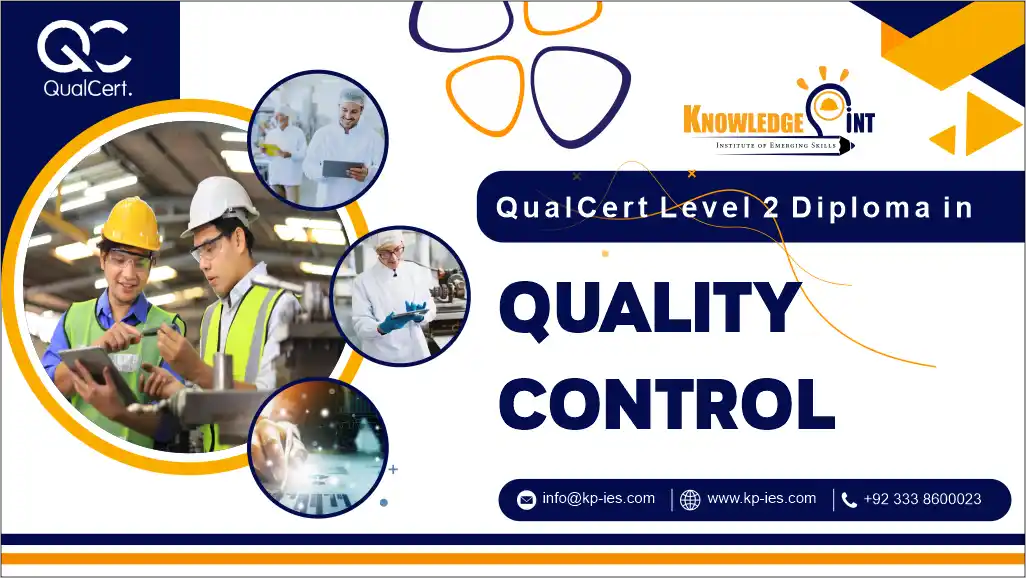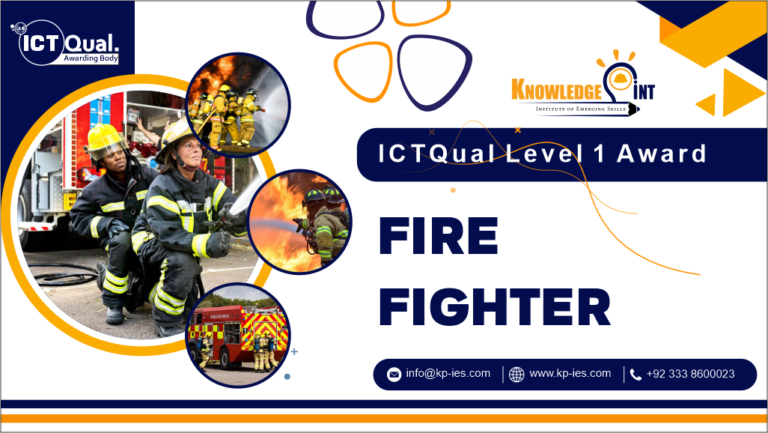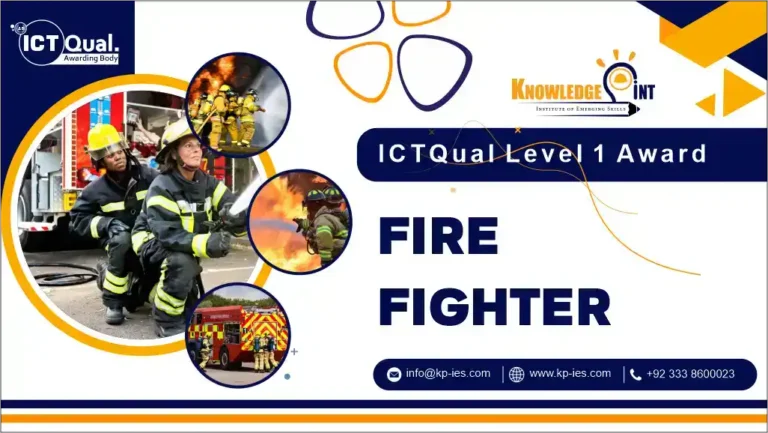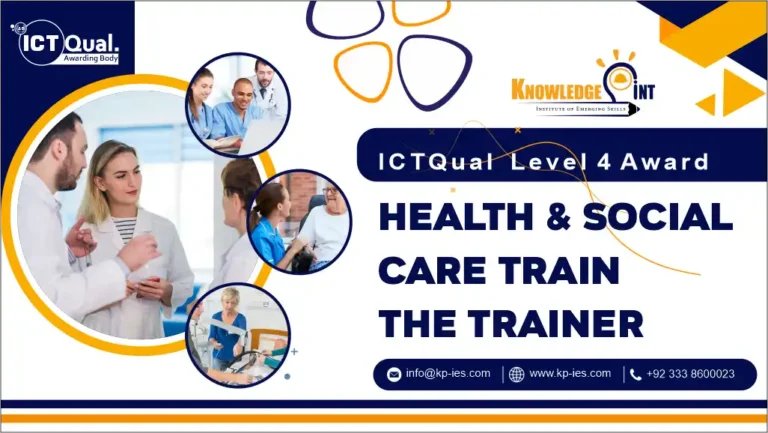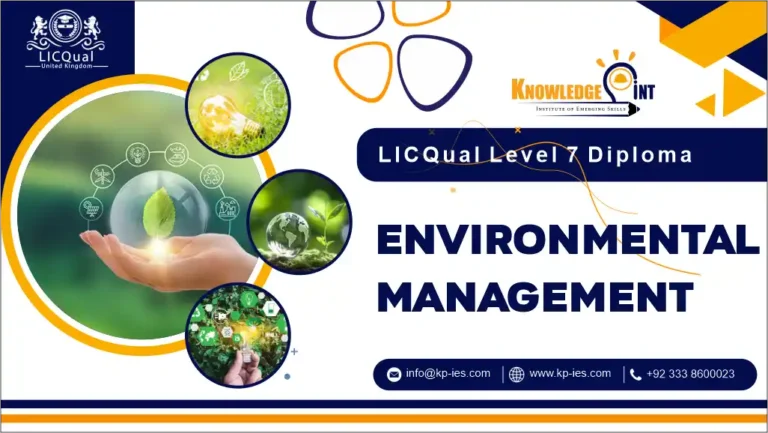Quality control is the backbone of every successful organization, ensuring that products and services meet rigorous standards of excellence. For professionals aiming to deepen their expertise and advance their careers in this pivotal field, the QualCert. Level 2 Diploma in Quality Control (QC) offers a comprehensive pathway to mastery. This diploma program builds upon foundational knowledge, equipping individuals with advanced skills, strategic insights, and industry-relevant competencies necessary to excel in roles that demand meticulous attention to detail and adherence to quality standards.
The QualCert. Level 2 Diploma in Quality Control (QC) is an intermediate-level qualification designed to provide in-depth knowledge and practical skills in quality assurance and control. It goes beyond basic principles to encompass advanced concepts, methodologies, and best practices essential for ensuring product/service reliability, customer satisfaction, and organizational success. Whether you’re looking to advance your career or transition into a specialized role, this diploma program prepares you to tackle complex quality challenges and drive continuous improvement across diverse industries.
The QualCert. Level 2 Diploma in Quality Control (QC) equips individuals with advanced knowledge, practical skills, and strategic insights essential for mastering quality assurance and control in today’s competitive business environment. By achieving the learning outcomes and embracing the opportunities offered by this diploma, you’ll be well-prepared to lead quality improvement initiatives, ensure regulatory compliance, and drive organizational excellence. Embrace the journey toward becoming a recognized leader in quality control, contributing significantly to organizational success and making a lasting impact in the dynamic field of quality management.
Course Overview
The QualCert. Level 2 Diploma in Quality Control (QC) consists of 9 mandatory units which are as follows.
The learning outcomes of QualCert. Level 2 Diploma in Quality Control (QC) include:
Quality Control Tools and Techniques
- Tool Selection: Identify and apply appropriate quality control tools such as Pareto charts, Ishikawa diagrams, control charts, and scatter diagrams.
- Application Skills: Demonstrate proficiency in using quality control tools to analyze data, identify trends, and make informed decisions for process improvement.
- Problem-Solving: Utilize tools effectively to address quality issues, reduce defects, and optimize processes.
Quality Standards and Regulations
- Understanding Standards: Interpret and apply quality standards and regulations relevant to specific industries and organizational contexts.
- Compliance Management: Implement strategies to ensure compliance with quality standards, regulations, and customer requirements.
- Audit Preparedness: Prepare for and participate in quality audits to verify adherence to standards and regulatory requirements.
Advanced Inspection and Testing Methods
- Advanced Techniques: Master advanced methods for conducting inspections and testing to validate product/service quality and compliance.
- Quality Assurance: Implement rigorous inspection protocols to detect defects, ensure product/service conformity, and maintain customer satisfaction.
- Continuous Improvement: Use inspection data to drive continuous improvement initiatives and enhance quality assurance processes.
Quality Management Systems (QMS) and Six Sigma
- QMS Implementation: Design, implement, and maintain effective Quality Management Systems (QMS) aligned with organizational goals and ISO standards.
- Six Sigma Methodologies: Apply Six Sigma principles, DMAIC (Define, Measure, Analyze, Improve, Control) methodology, and statistical tools to achieve process improvements and reduce variation.
- Process Optimization: Optimize processes to enhance efficiency, minimize waste, and deliver consistent quality products/services.
Statistical Analysis in Quality Control
- Advanced Statistical Methods: Apply advanced statistical techniques such as regression analysis, hypothesis testing, and ANOVA (Analysis of Variance) to analyze quality data.
- Data-Driven Decision Making: Interpret statistical findings to make data-driven decisions, predict outcomes, and optimize process performance.
- Process Capability: Assess process capability and performance using statistical analysis to meet quality objectives and customer expectations.
Quality Control Documentation and Reporting
- Documentation Standards: Create and maintain comprehensive quality control documentation, including procedures, work instructions, and audit reports.
- Report Accuracy: Ensure accuracy, clarity, and compliance in quality control documentation to facilitate effective communication and decision-making.
- Continuous Improvement Feedback: Use documentation and reporting to provide feedback for continuous improvement initiatives and corrective actions.
Safety Integration and Risk Management
- Safety Standards: Integrate safety standards and risk management practices into quality control processes to ensure workplace safety and mitigate operational risks.
- Risk Assessment: Conduct risk assessments, identify potential hazards, and implement controls to prevent safety incidents and maintain compliance.
- Safety Culture: Promote a culture of safety awareness and compliance among team members and stakeholders.
Leadership in Quality Control
- Strategic Leadership: Develop leadership skills to lead quality control teams, drive organizational change, and foster a culture of quality excellence.
- Team Management: Effectively manage teams, delegate responsibilities, and inspire collaboration to achieve quality goals and objectives.
- Stakeholder Engagement: Collaborate with internal and external stakeholders to align quality control initiatives with organizational objectives and customer expectations.
Capstone Project
- Project Planning: Plan and manage a comprehensive capstone project that applies learned principles, methodologies, and tools to address a real-world quality control challenge.
- Implementation: Execute the capstone project, gather data, analyze results, and make recommendations for process improvement or quality enhancement.
- Presentation and Evaluation: Present findings, outcomes, and recommendations from the capstone project to stakeholders, receive feedback, and demonstrate mastery of quality control concepts.
These learning outcomes collectively prepare individuals for leadership roles in quality control, ensuring they have the skills, knowledge, and abilities to drive continuous improvement, uphold quality standards, and contribute to organizational success.
Course Benefits of the QualCert. Level 2 Diploma in Quality Control (QC) :
1. Specialized Expertise
- Auditing Proficiency: Gain specialized knowledge and skills in auditing energy management systems according to the ISO 50001:2018 standard.
- Industry Recognition: Earn a globally recognized qualification that demonstrates your proficiency as an energy management systems auditor.
2. Career Advancement
- Expanded Career Opportunities: Qualify for roles such as Lead Energy Auditor, Energy Management Consultant, or Compliance Officer.
- Higher Earning Potential: Enhance your value to employers and increase your earning potential with specialized expertise in energy management auditing.
3. Industry-Relevant Skills
- Practical Application: Acquire practical skills and techniques for planning, conducting, and documenting energy management system audits.
- Effective Communication: Develop communication skills to interact with auditees, audit teams, and stakeholders effectively.
4. Contribution to Sustainability
- Promotion of Energy Efficiency: Play a key role in promoting energy efficiency and reducing environmental impact within organizations.
- Support for Sustainable Practices: Assist organizations in implementing and maintaining energy management systems that support sustainability goals.
5. Quality Assurance
- Compliance Assurance: Help organizations achieve compliance with ISO 50001:2018 requirements and other relevant regulatory standards.
- Risk Mitigation: Identify areas of non-conformance and provide recommendations for corrective actions to mitigate risks.
6. Continuous Professional Development
- Lifelong Learning: Engage in continuous professional development by staying updated with the latest developments and trends in energy management auditing.
- Networking Opportunities: Connect with industry professionals, auditors, and experts, expanding your professional network and opportunities.
7. Organizational Benefits
- Improved Performance: Contribute to the improvement of organizational energy performance through effective auditing and recommendations for continuous improvement.
- Enhanced Reputation: Help organizations build a positive reputation for their commitment to energy management and sustainability practices.
8. Personal Growth
- Leadership Development: Develop leadership skills to effectively manage audit teams, delegate tasks, and ensure audit objectives are met.
- Confidence Boost: Gain confidence in your abilities as an energy management systems auditor through practical training and hands-on experience.
Since “QualCert. Level 2 Diploma in Quality Control (QC)” isn’t a recognized qualification, I don’t have specific information on its future progression. However, typically, after completing a diploma or certification in quality control, individuals can consider several paths for career advancement and professional growth:
- Advanced Certifications: Pursue advanced certifications such as Certified Quality Engineer (CQE), Six Sigma Black Belt, or Certified Quality Auditor (CQA) to deepen expertise in specific quality management disciplines.
- Higher Education: Consider enrolling in a bachelor’s or master’s degree program in quality management, industrial engineering, or a related field to expand knowledge and qualify for higher-level managerial or leadership roles.
- Specialization: Focus on specialized areas within quality control such as regulatory compliance, lean manufacturing, risk management, or supplier quality management to enhance skills and career prospects.
- Career Advancement: Seek opportunities for promotion to senior-level positions such as Quality Control Manager, Quality Assurance Director, or Continuous Improvement Manager, where responsibilities include overseeing quality programs, leading teams, and driving organizational excellence.
- Consulting and Training: Explore opportunities in quality management consulting or training roles, providing expertise and guidance to organizations looking to improve their quality control processes and outcomes.
- Industry Leadership: Contribute to industry standards committees, participate in professional associations, and stay updated on emerging trends and technologies to influence and advance the field of quality control.
- Global Opportunities: Consider roles in multinational corporations or international organizations where knowledge of global quality standards and cross-cultural competence are essential.
- Continuous Learning: Stay current with industry advancements through continuing education, workshops, conferences, and professional development activities to maintain relevance and expertise in quality control practices.
By leveraging the foundational knowledge and practical skills gained from the QualCert. Level 2 Diploma in Quality Control (QC), individuals can pursue diverse opportunities for career progression, professional development, and leadership in the dynamic field of quality management.

